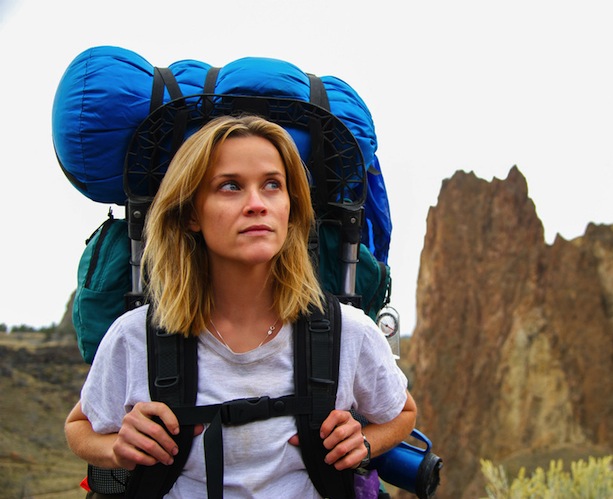Fuse Film Review: Just Wild About “Wild”
Wild is a compelling stream-of-consciousness narrative that mirrors how we actually make sense of our life experiences as we have them and then remember them.
Wild, directed by Jean-Marc Vallée. At screens around New England.

Reese Witherspoon in “Wild” — Mother Nature and glamour don’t mix.
By Paul Dervis
Wild has the feel of a small, independent film, the kind you might have seen from John Cassavetes forty years ago. Thematically it is a close relative to Into the Wild, but it is oh so much more honest. It is a small film painted, literally, across the canvas of a vast landscape.
And it makes one look at Reese Witherspoon in a new light.
She goes it alone, without the aid of Hollywood glamour. No detectable make-up, so all the blemishes that life chisels on us all are evident. Her one tool is her acting ability, and that is on display throughout. If you were not a fan of Witherspoon’s before, then you surely will be one now.
Based on Cheryl Strayed’s memoir Wild: From Lost to Found on the Pacific Crest Trail, this film takes considerable risks from the beginning. The opening scene finds Cheryl in the middle of her thousand mile trek on the PCT from Southern California to Oregon. She is alone, apparently stuck on the side of a challenging mountain. Her feet are blistered and she has just lost a toenail. And then she loses a boot. In frustration, she tosses the other boot off the cliff and releases a primal scream. She is lost, she is in danger of losing her life, and her journey appears hopeless.
Flashback.
Cheryl has been on a downward spiral since the death of her mother, Bobbi, from cancer. When her mother was alive, Cheryl classified her as simple and unsophisticated. She saw herself as complex and urbane. This treacherous hike might be the means for Cheryl to cleanse herself of guilt; it might be part of a strategy that will force her to reflect on her past. Or, perhaps, it is a way to make amends to her mom. Cheryl isn’t sure herself; she just knows she must try it.
Since Bobbi’s death, Cheryl’s life has undergone a disastrous transformation. She had a loving husband and was a good student in college; now she is a heroin addict who has sex with strangers in bathrooms and back alleys. Throughout this fall into darkness she catches glimpses of her mother, as if she is watching her degradation. Clearly, Cheryl has lots of unresolved issues surrounding this relationship.
Bobbi, played with an innocent panache by Laura Dern, embraced life and all it had to offer. She had been married to an alcoholic ne’er-do-well who left her with very little, but she never regretted the choices she made. She lived simply, but well. She had her children and the horse she loved, and she remained positive in the face of death. A stark contrast to her daughter.
Even some of the flaws in Wild come full circle and ultimately help it succeed. Cheryl, one of the few women on the trail, gets a lot of help from fellow travelers, attention that invites the viewer to cynically conclude that that her journey is aided by her good looks. But then, near the end, Cheryl is camping with some male students and the ranger on the trail brings her coffee and donuts. The boys make a point of commenting that they are never treated so well.
And Cheryl’s backpack! It must be as big as she is. How can she journey a thousand miles with it on her back? It stretches believability. But at her first campsite a weekend tripper tells her the same thing and proceeds to empty the backpack out. There are a few continuity blips. Early on, Cheryl has big scrapes on her knees. A couple of days later, they have vanished. In truth, there are quite a few of these small issues, but it is not fair to the considerable power of this film to nitpick.
Wild moves seamlessly around and about time and space as we follow Cheryl on her traumatic walkabout. Director Jean-Marc Vallée (Dallas Buyers Club) and screenwriter Nick Hornby show no interest in providing a roadmap for these succession of images — and that was the absolutely right choice. Too many contemporary films are driven by a patronizing obligation to explain everything, apparently motivated by the fear that the audience is too simple to follow a storyline that veers from strict chronological order. What Vallée creates in Wild is a compelling stream-of-consciousness narrative that mirrors how we actually make sense of our life experiences as we have them and then remember them.
The payoff is a film reflecting pure life, and that is very rewarding.
Paul Dervis has been teaching drama in Canada at Algonquin College as well as the theatre conservatory Ottawa School of Speech & Drama for the past 15 years. Previously he ran theatre companies in Boston, New York, and Montreal. He has directed over 150 stage productions, receiving two dozen awards for his work. Paul has also directed six films, the most recent being 2011’s The Righteous Tithe.
Tagged: Jean-Marc Vallee, Laura Dern, Paul Dervis, Reese Witherspoon
